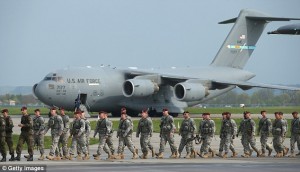
US military leaders propose sending more forces to Europe to deter Russia
U.S. military officials have proposed sending more troops to Europe to deter the threat of aggression by Russia and have stepped training exercises aimed at countering possible interference with troop transfers by Moscow.
The Wall Street Journal reports that proposals for the deployment of multiple U.S. brigades in Europe were made over the weekend at the Reagan National Defense Forum at the Ronald Reagan Presidential Library in Simi Valley, Calif.
The U.S. Army currently has two infantry brigades based in Eastern Europe, totaling approximately 7,000 soldiers. One other brigade rotates in and out of Europe on a regular basis. Army Chief of Staff Gen. Mark Milley told the Journal that he would like to send attack helicopter units and artillery brigades to Europe as well as more rotating brigades.
Gen Philip Breedlove, the supreme allied commander of NATO, told the Journal that decisions on the proposals would be made “in the next couple of months.” Any plans for a troop increase must be developed by the Pentagon, approved by President Obama and funded by Congress. The paper reported that funding for the troop increase would be included in a budget request sent to Congress early next year.
Word of the proposed troop increase comes a day after Defense Secretary Ash Carter warned against Russian aggression in some of his strongest remarks since becoming Pentagon chief this past February. He described Russian forces’ “challenging activities” at sea, in the air, in space and in cyberspace. Carter also said Moscow was “violating sovereignty in Ukraine and Georgia and actively trying to intimidate the Baltic states.”
“We do not seek a cold, let alone a hot, war with Russia,” Carter said. “We do not seek to make Russia an enemy. But make no mistake; the United States will defend our interests, our allies, the principled international order, and the positive future it affords us all.”
Under President Vladimir Putin, Russia is challenging the U.S. in many arenas, including the Arctic, where last year Moscow said it was reopening 10 former Soviet-era military bases along the Arctic seaboard that were closed after the Cold War ended in 1991. Russia also is flying more long-range air patrols off U.S. shores and increasing submarine patrols and exercises.
However, The Journal reported that the White House had asked some military officials in recent weeks to temper some of their comments about Russia. The Obama administration has criticized Russia over its actions in Eastern Europe, but it has also spoken of the importance of involving Moscow in talks on the future of Syria in an effort to resolve that country’s civil war.
“I fear that as we are dealing with Russia in Syria, the eyes are off [Ukraine],” Gen. Breedlove told The Journal in an interview published late Sunday. “Why would we want our first negotiations on how we cooperate to be in Syria and then possibly allow the eyes of the world to accept what happened in Crimea?”
Russian officials have previously said that Moscow does not consider rotational forces to be different from a permanent buildup of troops. Meanwhile, the Journal reports that NATO leaders next month are likely to discuss increasing the number of troops stationed in member states bordering Russia and putting them under formal command of the alliance.
“The challenge here is to deter further aggression without triggering that which you are trying to deter,” Gen. Milley told the Journal. “It is a very difficult proposition.”





Leave a Reply